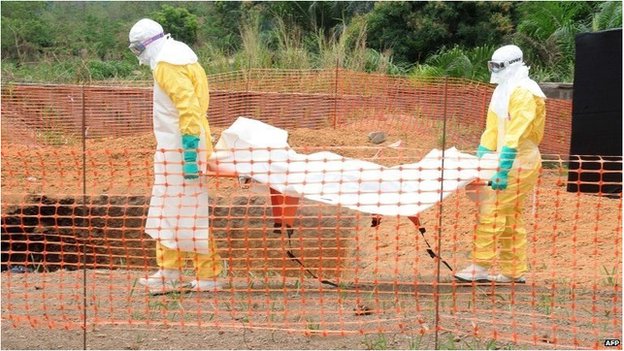Millions of Ebola vaccine doses by end of 2015, WHO says

Millions of doses of experimental Ebola vaccines will be produced by the end of 2015, the World Health Organization has announced.
It said “several hundred thousand” would be produced in the first half of the year.
And vaccines could be offered to health workers on the frontline in West Africa as soon as December 2014.
However, the WHO cautioned that vaccines would not be a “magic bullet” for ending the outbreak.
There is no proven cure or vaccine for Ebola.
In response to the largest epidemic of the disease in history, the WHO is accelerating the process of vaccine development
It normally takes years to produce and test a vaccine, but drug manufacturers are now working on a scale of weeks.
In other developments
- Dozens of people are being monitored in Mali after the country confirmed its first case of Ebola
- Both nurses who were infected with Ebola in Dallas, Texas are now clear of the virus.
- Health officials in New York are seeking people who came into contact with a doctor who tested positive after returning from Guinea
- European Union leaders agreed to increase their financial help on fighting Ebola in West Africa from some 600m euros ($758m; £743m) to one billion
Correct dose
Two experimental vaccines, produced by GlaxoSmithKline (GSK) and the Public Health Agency of Canada, are already in safety trials.
The GSK vaccine is being tested in Mali, the UK and the US. Research on the Canadian vaccine is also under way in the US with further trials expected to start in Europe and Africa soon.
The results are expected in December. After that, trials will move to countries affected by Ebola, probably starting with Liberia.
That will allow researchers to assess how effective the vaccine is and what dose is needed to provide protection.
Volunteers on the frontline of the epidemic will be vaccinated first
Healthcare workers, who place themselves at risk when treating patients, will take part in the first trials in West Africa.
The WHO says we should have the first hints of how effective these experimental vaccines are by April.
There are no plans for mass vaccination before June 2015 but the WHO has not ruled it out.
The WHO says vaccines are likely to be key to ending the outbreak, even if cases fall in the next few months.
Out of media player. Press enter to return or tab to continue.
Dr Marie Paule Kieny, WHO: “Pharmaceutical companies committed to ramping up production”
Dr Marie Paule Kieny, a WHO assistant director-general, said: “While we hope that the massive response, which has been put in place will have an impact on the epidemic, it is still prudent to prepare to have as much vaccine available as possible if they are proven effective.
“If the massive effort in response is not sufficient, then vaccine would be a very important tool.
“And even if the epidemic would be already receding by the time we have vaccine available, the modelling seems to say vaccine may still have an impact on controlling the epidemic.”
The vaccine plan was the culmination of a day of talks at the WHO in Geneva.
As well as the two vaccines already in trials, there are a further five in the pipeline which could yet play a role in the outbreak.
The World Bank and the charity Medecins Sans Frontieres will help finance the vaccine.
Continue reading the main story
Ebola deaths in West Africa
Up to 19 October
4,877
Deaths -probable, confirmed and suspected
(Includes one death in US)
- 2,705 Liberia
- 904 Guinea
- 1,259 Sierra Leone
- 8 Nigeria
Source: WHO
Getty
Dr Marta Tufet, from the Wellcome Trust and part of the talks in Geneva, told the BBC News website: “I think we’ve made some majors steps forward, it’s been a very significant meeting.
The key news is that money doesn’t seem to be an issue, everyone’s supporting this”
Dr Marta TufetWellcome Trust
“The key news is that money doesn’t seem to be an issue, everyone’s supporting this and it’s a case of making sure we’re prepared.
“The standard method of public health control will win in the end, but a vaccine could have a very strong impact on the current epidemic.”
There are also suggestions that an “indemnity fund” could be set up in case people have a serious adverse reaction to a vaccine being rushed through.
But until a vaccine is found to prevent the virus from spreading, treating and isolating sufferers will remain the key strategy for containing the outbreak.
Big risk
Jonathan Ball, a professor of virology at the University of Nottingham, commented: “This is a big risk because we simply don’t know if the vaccines will work.
“But clearly, given the scale of problem in Africa, a problem that has arisen through international apathy, we are having to prepare for the worse.”
He added that it would be difficult to deliver the vaccine – which needs to be stored at very low temperatures – would be a major challenge in Africa.
Dr Benjamin Neuman, from the University of Reading, told the BBC: “I very much hope that the current outbreak will be over before the first vaccines ship, but even so, a vaccine will be important to long-term plans to prevent an Ebola outbreak on this scale from ever happening again.”
He said there were many “similarly frightening and incurable viruses” across Europe and the Americas but they were contained by infrastructure.
He said that for all the talk of vaccines: “The closest thing to a magic bullet that stops all diseases is still a hospital.”
Source: BBC